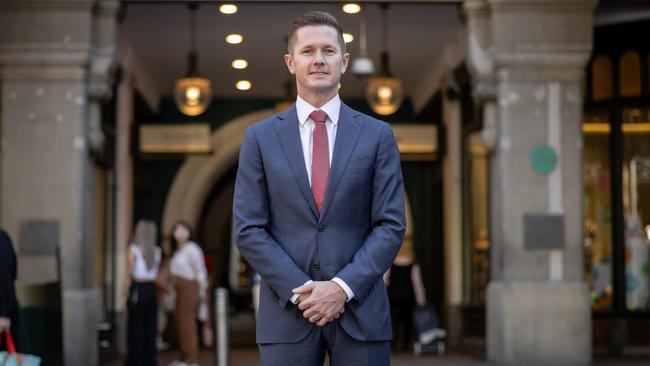McKell Institute report on Same Job, Same Pay more of the same from Labor and its lackeys

Yet another “independent” report championing the Albanese government’s Same Job, Same Pay legislation was published on Thursday, this time by the McKell Institute, a think tank that isn’t in any way associated with the Australian Labor Party or a union movement that’s so supportive of the contentious workplace reforms.
Except, of course, for its chair, Dan Walton, who was the national secretary of the Australian Workers Union. And most of its board, where the directors have been shamelessly plucked from a grab-bag of Labor and union royalty. There’s former Unions NSW secretary Mark Lennon, former Labor politicians Mary Easson and Rachel Nolan, plus union officials Misha Zelinsky, Narelle Clay and Melissa Donnelly.
Never mind. Closing Loopholes, Opening Opportunities, as the McKell report is known, is still considered wholly independent, despite being prepared “in collaboration with the Mining and Energy Union”, as it says on page two.

Employment Minister Murray Watt didn’t see a problem with the glaring lack of impartiality, which is why he held up the work as proof that Labor’s laws are “making sure people are being fairly paid”. He had less to say about raising salaries amid a national backdrop of declining productivity, of course.
Moreover, this is a report that backs in the findings of another report released in January – commissioned by the government – that was just as glowing of Labor’s industrial relations reforms and which was similarly billed as wholly independent.
Until we found out that pro-union and pro-Labor employment specialist Rae Cooper, the wife of Labor Assistant Minister Tim Ayres, was cited eight times across the document and broadly listed her support for the reforms. Plus she’s on record as having co-written at least two books with one of the reviewers, Mark Bray.
Which means we now have two supposedly independent reports overtly supportive of Labor’s IR laws, both written or aided by people sympathetic to unions and Labor governments – and both enthusiastically held up as proof that higher wages is what the country needs in an era of tanking growth.
Are we at the point where we can start calling this an astroturfing campaign?
Toilet humour
Sydney’s Belvoir St Theatre lost a good number of subscribers last year when the cast and crew of Never Closer, a production set during The Troubles in Northern Ireland, pushed out a slew of anti-Israel messaging in its brochures for the show.
The consequences were obvious. Jewish patrons were livid about the gross statements of “genocide” and “occupation”, cancelling their subscriptions and threatening to halt donations to the theatre. The Belvoir board, panic-stricken as it was, did absolutely nothing for three weeks. No apology or cancelled shows like the Sydney Theatre Company, which faced a near-identical backlash months earlier and lost a tonne of money mishandling the matter. So much for corporate expertise.
Belvoir’s 12-member board is chaired by Orica director Karen Moses and its NEDs include former Macquarie executive Stephen Allen, KPMG’s national chairman Alison Kitchen, Balnaves Foundation CEO Hamish Balnaves, Grok Ventures CEO Tan Kueh and Paul Oppenheim, the co-founder of Plenary. By the time a statement was finally released it wasn’t by any of them but by Belvoir’s executive director, Aaron Beach, and at that point the donor base had already brushed its hands of the joint.
Which is presumably why Beach is now shaking the tin for more donor generosity, if only to upgrade the theatre’s back-of-house facilities, like the dressing rooms and the reportedly manky bathrooms, which, he claims, aren’t as inviting as the “vastly superior loos” in the foyer.
Beach’s pitch is for donors to cough up a tax-deductible $3500 to buy the five-year naming rights to a stall or urinal in these superior front-of-house lavs. The money collected would then be deployed for a spruce up of the oval offices out the back, he said, in an email we obtained.
“This is your chance to claim a truly unique piece of Belvoir history – your name or a name of your choosing immortalised (for five years) in one of the most prominent locations in the theatre: our brand-new foyer loos!” Beach wrote.
“You might name a loo after a favourite Belvoir actor, a politician, someone named John (Gaden, perhaps?), or give it an iconic quote, or simply something to make audiences chuckle during interval (sic).”
An idea with much potential. Perhaps someone can buy a stall and call it the George Michael suite?
Helfie not so healthy
Tech unicorn or not? The jury is still out on George Tomeski’s Helfie.ai start-up, which claims to be able to diagnose everything from tuberculosis to skin cancer through an app on your telephone.

Tomeski was last seen in public in late 2024, spruiking a capital raising round that would bring in up to $US200m from high profile and sophisticated investors, and give Helfie a paper valuation above the $US1bn mark – the magic number to become a tech unicorn.
Margin Call has had its doubts in the past. And we can confidently say that, on the available evidence, it hasn’t raised anything close to $US200m and its paper valuation is nowhere near $US1bn. Recent filings by the company show that it did raise capital in December, however.
Helfie issued 6 million shares in December at 18.4c, raising a grand total of $1.1m. The company now has 86.8 million shares held by investors. At the latest share issue, that values the company at a grand total of around $16m – some $984m short of Tomeski’s bold predictions.
And far from a capital raising backed by sophisticated US investors and institutions, the December raising came from friends and family of the company.
Helfie chief technical officer Nikhal Sehgal kicked in $936,326, and other members of the Sehgal family bought another $122,000 worth of stock. Helfie’s recently appointed head of research and development, Luis Felipe de Deus, was issued $11,000 worth of stock and UK-registered IT developer Transputec was issued with shares worth about the same amount. Hardly an A-list of high net worth backers. Now, to be fair, visits to the capital market get pushed back for a variety of reasons and that doesn’t necessarily always reflect badly on the company involved.
Margin Call is told the promised $US200m raising is imminent, and there’s still plenty of time for the doubters to be proved wrong. Only time will tell.
Gupta magic
How do you “prepay outstanding amounts”? Only Sanjeev Gupta knows. A debt rescue for Sanjeev Gupta’s Infrabuild business is only weeks away, according to the latest pronouncement by the company on Thursday morning.

The deal, according to the company, will see Infrabuild issue another $US150m of notes to “prepay outstanding amounts” to its current lenders.
Can you really “prepay outstanding amounts”? To a layman’s eye the phrase rather suggests Infrabuild is, in fact, behind on its debt repayments. That is sophistry probably best left to the lawyers.
But the kicker in the announcement is more bizarre. A quote from a spokesperson representing a sub-set of bond holders: “We are supportive of the shareholder’s vision for the company and have confidence in the management of InfraBuild. We’re pleased to work together for a successful outcome that enhances the credit profile and liquidity of the business. InfraBuild is a market leader, with a strong management team and board – which is well positioned to capture future growth alongside their end markets. InfraBuild is a strong and well-established business with a positive outlook under an experienced leadership team led by chief executive officer, Francisco Irazusta.”
Seriously? If you believe it, why wouldn’t you put your name to it?






To join the conversation, please log in. Don't have an account? Register
Join the conversation, you are commenting as Logout